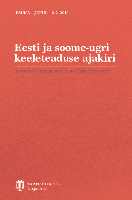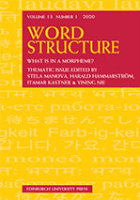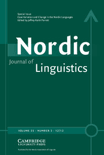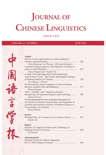
Eesti ja Soome-Ugri Keeleteaduse Ajakiri-Journal of Estonian and Finno-Ugric Linguistics
Scope & Guideline
Advancing the Understanding of Finno-Ugric Linguistics
Introduction
Aims and Scopes
- Syntactic and Morphological Analysis:
The journal frequently publishes research focusing on syntactic structures and morphological rules across various Finno-Ugric languages, examining how these elements function within different linguistic contexts. - Language Variation and Change:
A significant area of focus is the exploration of language variation and change, including dialectal studies and historical linguistics, shedding light on the evolution and current state of Finno-Ugric languages. - Sociolinguistic Perspectives:
The journal includes studies that address sociolinguistic issues, such as language use in different social contexts, language ideologies, and the impact of bilingualism and language contact. - Corpus-based Studies:
There is a consistent emphasis on empirical, corpus-based research, which provides quantitative data on language usage, frequency of grammatical constructions, and other linguistic phenomena. - Language Planning and Policy:
Papers often discuss language planning, policy-making, and the challenges faced by minority languages, particularly in the context of Estonian and other Uralic languages.
Trending and Emerging
- Pragmatics and Discourse Analysis:
There is a growing interest in the pragmatics of language use, including studies on discourse particles, gender dynamics in language, and context-dependent language functioning. - Digital Linguistics and Online Language Use:
Research exploring the impact of digital communication on language use, including the role of social media and online interactions in shaping contemporary linguistic practices, has gained momentum. - Language Ideologies and Attitudes:
An increasing number of studies focus on language ideologies, beliefs about language, and their implications for language policy and identity, reflecting broader sociolinguistic concerns. - Gender and Language:
Emerging themes around gender dynamics within language use, particularly in Estonian, are becoming more prevalent, indicating a shift towards exploring intersectionality in linguistic studies.
Declining or Waning
- Historical Linguistics:
Although historical linguistics has been a traditional focus, recent publications indicate a waning interest in purely historical analyses, with a shift towards more contemporary linguistic phenomena. - Fieldwork Studies:
Research based on fieldwork and ethnographic studies appears to have decreased, possibly due to the challenges posed by recent global events, leading to a preference for desk-based or corpus studies. - Cross-linguistic Comparisons:
There seems to be a decline in papers that engage in extensive cross-linguistic comparisons outside the Finno-Ugric family, as the journal increasingly emphasizes intra-family studies.
Similar Journals

Turkic Languages
Fostering Understanding of Turkic Languages WorldwideTurkic Languages is an esteemed academic journal published by HARRASSOWITZ VERLAG, dedicated to the exploration and analysis of Turkic languages within the broader fields of linguistics and language studies. With an ISSN of 1431-4983, this journal serves as a vital platform for researchers, professionals, and students interested in the intricate structures, dynamics, and cultural contexts of Turkic languages. Although it currently operates without an Open Access option, the journal's commitment to quality research is evident in its placement within the Q4 category of Linguistics and Language for 2023, alongside its Scopus rankings where it stands in the 30th and 26th percentiles for Language and Linguistics across Arts and Humanities and Social Sciences, respectively. The journal's scope encompasses a variety of linguistic phenomena, striving to foster a deeper understanding of Turkic languages and their significance in the global linguistic landscape. With converged years from 2017 to 2022, Turkic Languages continues to uphold its reputation as a crucial resource for advancing scholarship in this specialized field.

Journal of Slavic Linguistics
Exploring the Depths of Slavic LinguisticsJournal of Slavic Linguistics, published by SLAVICA PUBLISHERS, is a key academic resource dedicated to the exploration of Slavic languages and linguistics. Established to provide a comprehensive platform for scholarly research, this journal addresses the intricate dynamics of Slavic phonetics, syntax, semantics, and discourse, making significant contributions to both theoretical and applied linguistics. The journal holds an impact factor that reflects its value in the linguistic community, particularly as it is ranked in the Q4 category in Linguistics and Language for 2023. With a focus on a wide range of topics within the field, the Journal of Slavic Linguistics serves as an essential reference for researchers, educators, and students alike, fostering an appreciation and deeper understanding of Slavic linguistic phenomena. Although currently not an Open Access journal, it remains accessible to a broad audience keen on engaging with contemporary linguistic scholarship.

Word Structure
Advancing Linguistic Theory and Empirical InsightsWord Structure is a premier journal published by Edinburgh University Press, specializing in the dynamic field of linguistics and language studies. Since its inception in 2008, this journal has carved a niche within the academic community, achieving an impressive Q1 ranking in the Linguistics and Language category for 2023, further affirming its reputation as a leading platform for innovative research. With its robust rankings in both the arts and humanities and social sciences spheres, positioned in the top percentiles, Word Structure serves as an essential resource for linguists, researchers, and students interested in the intricate mechanisms of word formation and morphology. Although it does not offer open access, the journal is dedicated to advancing the understanding of linguistic theory and empirical findings, making significant contributions to ongoing discussions in the field. By facilitating scholarly dialogue and promoting high-quality research, Word Structure plays a crucial role in shaping contemporary linguistics and enhancing the academic discourse surrounding language structures.

Catalan Journal of Linguistics
Pioneering Research in Catalan Language Dynamics.Catalan Journal of Linguistics is a distinguished academic publication dedicated to the dynamic field of linguistics and language studies. Published by the Universitat Autònoma de Barcelona, this open-access journal has been disseminating impactful research since 2002, making significant contributions to the understanding of linguistic theory, language acquisition, and sociolinguistics, particularly within the Catalan language context. With a robust engagement in the scholarly community, it proudly holds a Q2 ranking in Linguistics and Language as of 2023, reflecting its commitment to high standards of research and innovation. The journal is accessible to a global audience, promoting the free exchange of knowledge beyond geographical boundaries, and serves as an essential platform for researchers, professionals, and students aiming to stay at the forefront of linguistic inquiry. With its rich archive of articles, the Catalan Journal of Linguistics stands as a vital resource for anyone keen to explore contemporary linguistic issues and advancements.

REVUE DE LINGUISTIQUE ROMANE
Charting the Evolution of Romance LinguisticsREVUE DE LINGUISTIQUE ROMANE, published by the esteemed SOCIÉTÉ LINGUISTIQUE ROMANE, is a prominent academic journal dedicated to the exploration of Romance linguistics. With its ISSN 0035-1458, the journal plays a significant role in advancing knowledge within the fields of linguistics and the history and philosophy of science. Although it does not currently offer Open Access, it provides critical insights and peer-reviewed research that are indispensable for scholars, educators, and students interested in the nuances of Romance languages. The journal, which has seen converged coverage from 2006 to 2017, and then again from 2019 to 2021, is ranked in the third quartile (Q3) across various categories within Scopus, reflecting its established presence in the academic community. As a vital resource for interdisciplinary studies, REVUE DE LINGUISTIQUE ROMANE is instrumental for those seeking to deepen their understanding of linguistic structures, cultural nuances, and the historical development of Romance languages.

Nordic Journal of Linguistics
Connecting scholars through innovative linguistic studies.Nordic Journal of Linguistics, published by Cambridge University Press, serves as a prominent platform for the dissemination of cutting-edge research in the field of linguistics. Established in 1978 and spanning over four decades, the journal has curated a rich repository of scholarly work that reflects the dynamic and evolving nature of language studies. With an impressive Q2 ranking in both the Linguistics and Language category and a commendable performance in Scopus rankings, placing it at the 74th percentile among Arts and Humanities, the journal is recognized for its high academic standards and impact on contemporary linguistic research. Scholars and practitioners can access a variety of studies that delve into different languages, linguistic theories, and methodologies, fostering broader understanding and dialogue within the linguistic community. Although the journal does not currently offer open-access options, it remains an invaluable resource for researchers, professionals, and students keen on advancing their knowledge of language and linguistics.

JOURNAL OF CHINESE LINGUISTICS
Pioneering Research in the Heart of Chinese Language StudiesJOURNAL OF CHINESE LINGUISTICS, published by the JOURNAL CHINESE LINGUISTICS, is a prominent periodical that serves as a vital resource for researchers and scholars in the fields of linguistics and Chinese studies. With its ISSN 0091-3723, this journal has been contributing to the academic community since 1996 and continues to publish innovative research until 2024. Although it is classified in the third quartile (Q3) for both Arts and Humanities and Linguistics categories, its focus on Chinese linguistics positions it uniquely within this specialized domain. The journal is committed to advancing the understanding of Chinese language structures, usage, and context, encouraging interdisciplinary dialogue among linguists and language researchers. While currently not labeled as open access, the journal remains accessible to institutions and scholars worldwide, creating an invaluable platform for disseminating knowledge. As such, it plays a critical role in promoting linguistic diversity and cultural awareness within the academic landscape.

Slovo a Slovesnost
Nurturing Excellence in Language StudiesSlovo a Slovesnost is a prominent academic journal dedicated to the field of linguistics and language studies, published by the Czech Language Institute of the Czech Academy of Sciences. With an ISSN of 0037-7031, the journal has established itself as a significant resource for researchers and professionals within the linguistic community. Its rigorous selection process and impactful contributions have earned it a commendable Q2 ranking in Linguistics and Language as of 2023, as well as Scopus rankings in the 58th percentile for Language and Linguistics. Offering insights into both theoretical and applied linguistics, Slovo a Slovesnost serves as an essential platform for cutting-edge research, fostering dialogue among scholars, and enriching the study of language within the Czech Republic and beyond. Although it does not provide open access, the journal supports a subscription model that ensures high-quality dissemination of knowledge to a dedicated audience of linguists, educators, and linguistic scholars. With coverage converging from 2004 to 2024, it continues to thrive as a vital corner of linguistic scholarship.

Verba-Anuario Galego de Filoloxia
Fostering Innovative Research in Language and PhilologyVerba-Anuario Galego de Filoloxia is a prominent academic journal published by UNIV SANTIAGO COMPOSTELA, dedicated to advancing the field of linguistics and language studies. Hailing from Spain, this journal provides a vital platform for researchers, educators, and students interested in Galician philology and its broader linguistic implications. Although it operates under traditional access models, the journal’s commitment to quality research is reflected in its categorization within Q3 in Linguistics and Language for 2023, showcasing its significant contributions to the field. Encompassing a convergence period from 2017 to 2024, Verba garners attention in both the Arts and Humanities and Social Sciences domains, with its Scopus rankings highlighting its moderate impact within these categories. By nurturing scholarly dialogue and disseminating innovative studies, Verba-Anuario Galego de Filoloxia plays a crucial role in promoting linguistic research, making it an essential resource for professionals and academic institutions striving to explore the complexities of language and philology.

Studi e Saggi Linguistici
Illuminating the Nuances of Linguistic PhenomenaStudi e Saggi Linguistici is a distinguished academic journal published by EDIZIONI ETS, based in Pisa, Italy. With its ISSN 0085-6827, this journal has established itself as a vital resource in the field of linguistics, particularly noted for its contributions since its inception in 2016. Although currently categorized in the lower quartile (Q4) by the 2023 metrics in the domains of Linguistics and Language within Scopus, it remains a significant platform for innovative research and critical discussions surrounding language studies. Focusing on both theoretical and practical aspects of linguistics, the journal serves as a nexus for scholars and practitioners alike, facilitating a rich interchange of ideas and knowledge in a rapidly evolving discipline. As an invaluable publication for researchers, professionals, and students, Studi e Saggi Linguistici is committed to advancing the understanding of linguistic phenomena and fostering scholarly communication in its field.